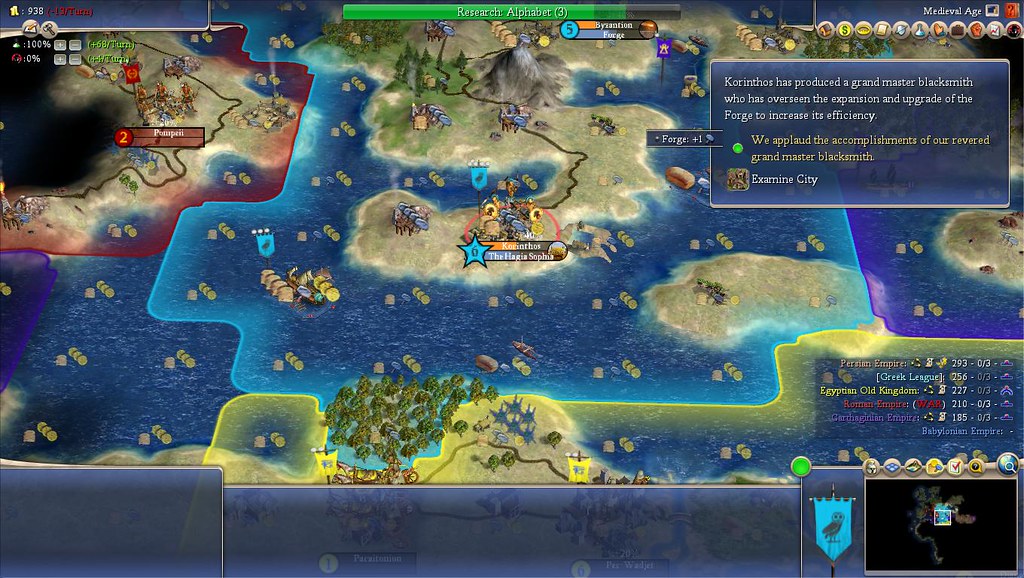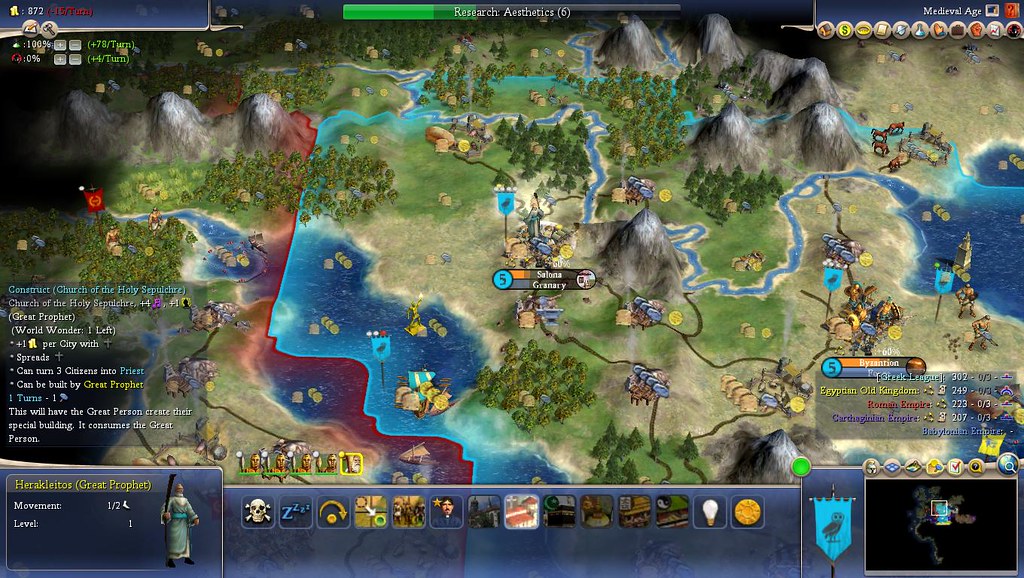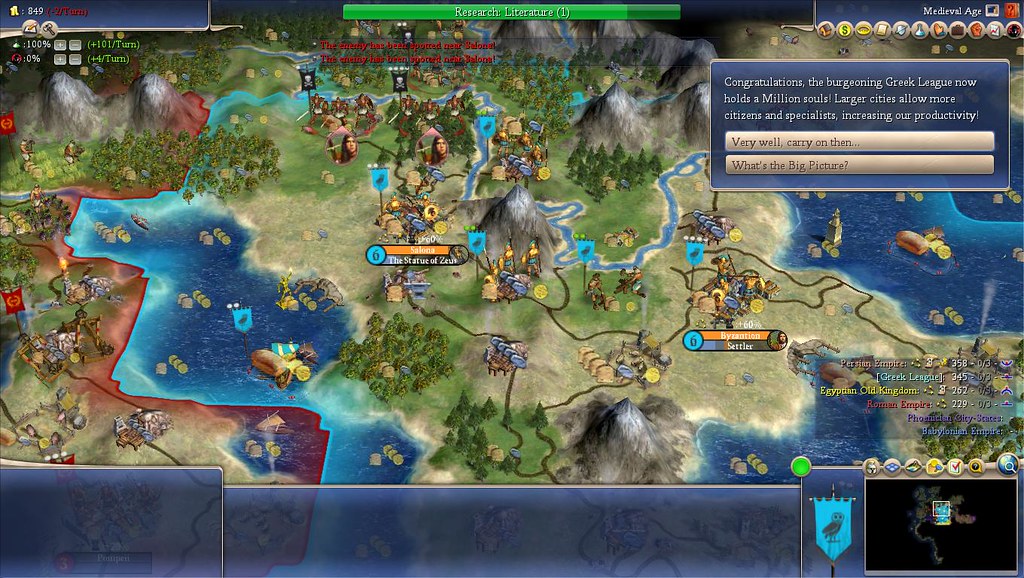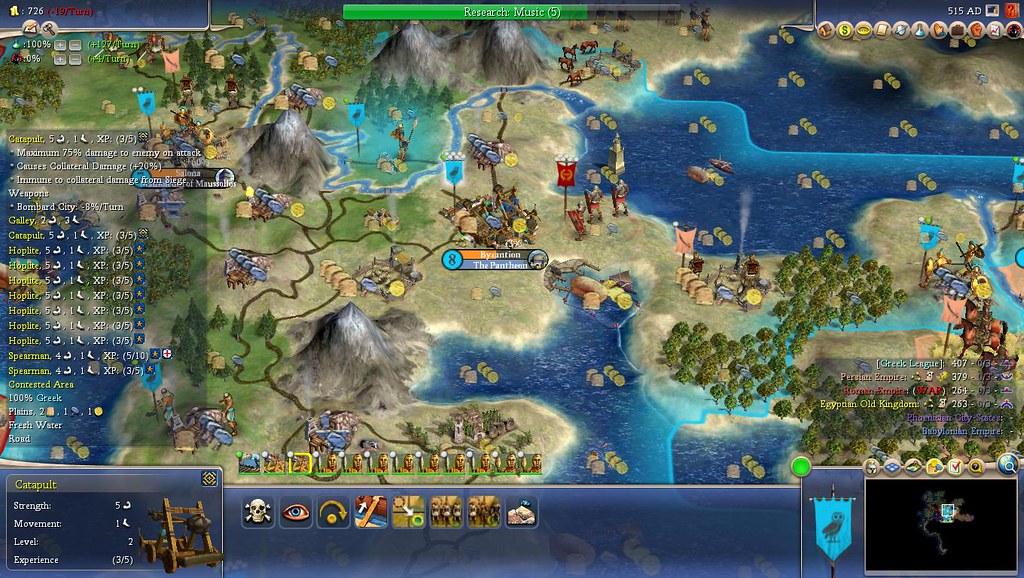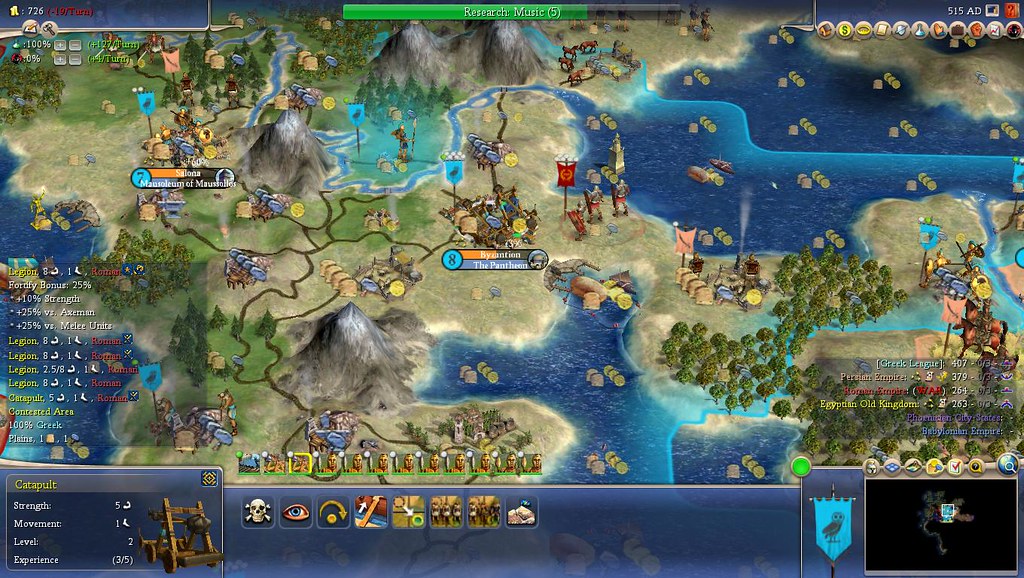Chapter 1: Hellas Arising

I suppose after years of RFC, we’re all pretty familiar with the starting Greek position. I actually had to reload twice because my galley containing the second settler was located in the Gulf of Corinth and I needed it to be in the Ionian. So not exactly the best sign, but I’m generally not one to be bothered by signs. I have decided for this game to settle Korinthos as my capital and Byzantion (1 W of its normal spot) as my second city. I can’t imagine there’s anything unusual about Korinthos as it is a wonderful city spot but I do think I should take a second to explain my rationale on this particular Byzantion placement. First, it still serves as a canal, so no issues there. Second, it has much greater production potential than standard Byzantion. I’ll need that production if I’m going to get any great number of wonders built there. Finally, this placement still has tons of food, having access to 2 Sheep, 1 Fish, 1 Clam, and eventually a Corn. I would rather use the Fish I’m missing out on to support a city in Anatolia itself. In any case, Byzantion has more food than my meager happiness will allow me to really use for a very long time, so I may as well get the extra production and health from this position.

I immediately begin my research with Masonry, which in DoC not only gives me access to the marble underneath Korinthos, but also lets me adopt the Forced Labor Civic (aka whipping). Greece may not have quite the whip necessity as many other civs, especially when played long-term, but it’s a good option to have. Both of my cities start off building Work Boats which will hugely expand my food supply once Korinthos’ borders expand. Korinthos follows its boat with another, while Byzantion will build a Pagan Temple which will help with both happiness and culture.
My next priority is Animal Husbandry. I can’t speak for everyone, but I love me some tile improvements, and Byzantion is surrounded with Sheep I can’t wait to fence in. As my research and construction continues, I notice that the Great Sphinx, which in DoC replaces Stonehenge, has been completed. To my surprise, it belongs to Babylon, while the Egyptians have gotten DoC’s version of the Hanging Gardens, which are available with Pottery. Looks like both those civs are off to a great start. I suppose it should be noted that in DoC, only civs which run the religious civic Pantheon are allowed to build wonders like these, so the fact that China or India hasn’t snagged one is no fault of their own.
Once Korinthos finishes its second Work Boat, it immediately begins work on the Great Cothon, which is DoC’s version of the Moai Statues, though it’s a World Wonder instead of a National one. Once Animal Husbandry has been researched, I start in on building Pastures alongside the mines and roads my workers have already been constructing. Research is directed toward Priesthood, and the Phoenicians decide to say hello and an Open Borders agreement is signed. Unfortunately for the Babylonians, they had captured Sur while it had been independent, and when it flipped to Phoenicia the stress, apparently, made them collapse. One less wonder-stealer to worry about, though Persia is almost certain to benefit in the long run.
After Byzantion finishes its Pagan Temple, it begins on a Work Boat. After reaching size 3, the boat is whipped and a Settler begun. I want to make sure to get my Adriatic outpost up and running before Rome spawns, otherwise it might become very difficult to expand in that direction. Soon enough, I’ve researched Priesthood and it’s time to start on Iron Working. Now, I’m sure anyone who’s familiar with RFC, or really Civ IV in general, realizes the importance of Priesthood, in that it unlocks the very powerful Oracle. One might wonder, then, why I would go after Iron Working next. Well, in DoC the Oracle (and Liberalism, for that matter) can only be used to research a tech if you’re already in that tech’s era. So, in order to get any real use out of the Oracle, I need to at least be in the Classical Era. I could try going for Medieval, but between Rome, Persia, and Egypt, I think I’d end up getting beat to the Oracle. So I’m researching Iron Working since it’s rather cheap with the intent of using the Oracle on an expensive Classical tech.
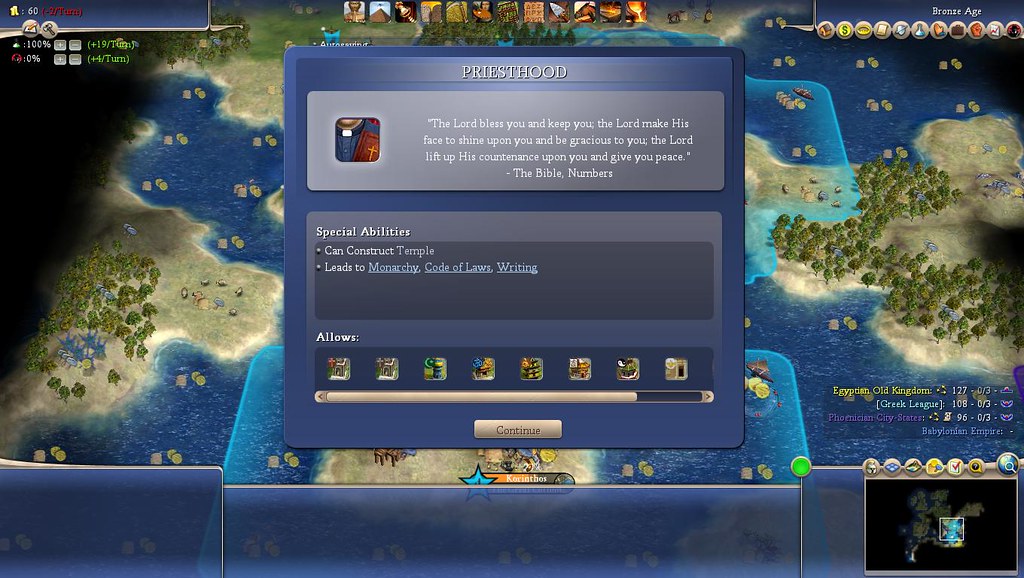
It doesn't take long before Byzantium finishes its Settler and work begins on the Temple of Artemis. The Greek UP works especially well with wonders that give free Specialists, so this wonder is especially strong. At this time I also get a fun little quest. I’m not sure if I’ll be able to finish it, as it will probably be a while until I have 7 cities, let alone 7 Libraries, but it’s a long time until the Renaissance, so we’ll see. The Settler heads to the Adriatic to found Salona, which begins work on a Pagan Temple. I forgot to take a screenshot of the founding of Salona but you can see its location in a few other screenshots. It may not be as powerful a location as Korinthos or Byzantion but it has a nice balance of food and production, plus gives me access to Pigs and Bronze.

Shortly after Salona is founded, Korinthos finishes the Great Cothon. My first wonder! First of many, if things go to plan. Baby steps. In any case, Korinthos will follow this with a Pagan Temple, a Library, and a Barracks. Between the Cothon and the mines which now fill Greece proper, Korinthos should be able to finish out its basic infrastructure in just a few turns. Rome’s spawn reminds me that I can’t ignore my military much longer, most of which will have to come from Korinthos, as Salona has a lot of infrastructure to build and Byzantion will be busy with wonders. Chopping helps Salona finish its Pagan Temple quickly, and I decide it should pop out a Work Boat before starting on the Oracle. At the current rate the Oracle will finish only a few turns after I get Iron Working, just as planned. As you can see, even random villagers are pitching in to ensure the lasting greatness of Hellas. Sure, all they can do is build a fence, but hey, every little bit helps.
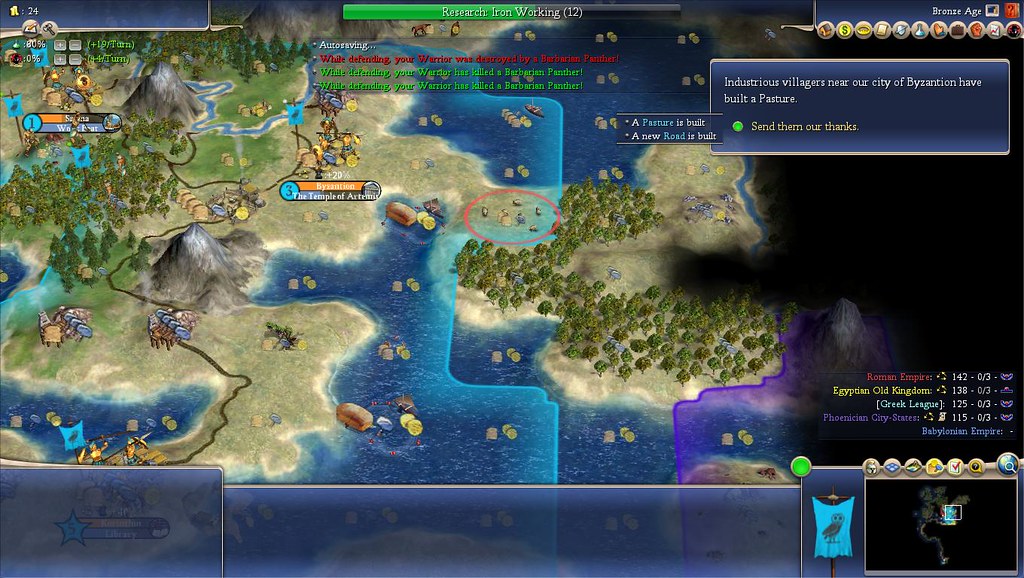
Once Korinthos finishes its Barracks, I decide to build up my army a little bit. Unfortunately, I haven’t yet finished mining the Bronze and I haven’t discovered Iron Working or Archery, so my only options are Warrior and Scout. If I had been smarter I probably would have just built some Walls or a Granary but instead I built some Warriors on the idea that they can be upgraded in a pinch and they’re just as effective as anything else once I’m a Monarchy. I only manage to build 2 before the Bronze is connected and I’m able to start pumping out Hoplites along with a few Spearmen. With Korinthos’ production they only take 2 turns each, so it’s not long at all until I have enough of an army that I think I’ll survive the inevitable Roman or Persian attack.
After Iron Working is discovered, research is begun on Monotheism. In DoC Monotheism founds Zoroastrianism rather than Judaism, but Persia has it at spawn and they already exist (though I haven’t met them yet) so it’s really not that important a tech for me. It is, however, on the line toward Theology, and I would absolutely love to found Catholicism ASAP. Even without the shrine wealth, which will probably get up to 20 quickly, it would be well worth my time just for the relationship bonuses and happiness buildings. Byzantium is quickly become a GP beast even without running specialists and it will become more of one once it completes its next project, the Ishtar Gate. This wonder increases your enemies’ War Weariness, which can’t be a bad thing. To the west, Salona completes the Oracle and starts on a Library while emphasizing food. With Oracle I take Metal Casting, which is an amazing tech, allowing Forges, Triremes, and the Colossus.
My first Great Person, a GS named Pythagoras, knows, like, a lot about triangles. So much, in fact, that he builds an Academy in Korinthos dedicated solely to them. Even the band is nothing but Triangle players. It sounds awful. Byzantium quickly completes the Ishtar Gate and moves on to a Library of its own, to be followed shortly by the Great Lighthouse. Once Monotheism is finished, we move on to Theology, which promises to take quite some time. Assuming I finish it before an Independent spawns Christianity, it will be well worth every turn. The Egyptians continue their solid game by finishing the Pyramids, I believe by using a Great Engineer. This is why I’m glad not to have bothered trying to get that wonder. Doing so would likely have just pushed the Egyptians in toward one I actually want.
While Korinthos continues pumping out a military and Salona grows a bit, Byzantium begins its work on the Great Lighthouse. Shortly thereafter, Kraisos, a Great Merchant, is born there, and takes off for India via Phoenicia and Persia. Luckily, he doesn’t run into any trouble en route and brings in a hefty 1100 gold when he finally arrives there. 1100 gold goes a long way at this stage of the game, let me tell you. Once Salona finishes the Library, work begins on the Colossus. Kraisos is nice enough to introduce us to the Persians during his journey, and they are more than willing to Open Borders. Several turns later, he would pull the same trick with India, but at that point my attention was elsewhere as those wretched Italians declared war on me!

Now for those of you who don’t play DoC, the Roman UP gives them a free army consisting of 2 Legions and a Catapult the first time they declare war on a Mediterranean civ. This army shows up somewhere in the vicinity of one of that civ’s cities. So it was that a Roman army appeared right in between all my cities. Unfortunately for the Romans, I was prepared for their treachery, and had 3 Hoplites and a Spearman in all of my cities. While I couldn’t defeat their army in the field, I was pretty sure they wouldn’t be able to get into any of my cities without reinforcements. They could, however, pillage at will. That they did, knocking out my access to both Iron and Bronze before settling in to bombard Salona. With my metals cut off, preventing me from building any more of an army, I focused instead on building a navy. If I could make sure the Romans couldn’t reinforce their army, they’d have no choice but to retreat back from whence they came or kill themselves on one of my fortified stacks.
With Salona finishing construction on the Colossus and Byzantium whipping the last bit of the Great Lighthouse, all 3 cities begin to churn out Triremes. The battle in the Adriatic swung wildly, with attacks and counterattacks interrupted by Pirates attacking ships from both sides. More importantly, the Roman city of Mediolanum was captured by Celtic barbarians from the north, and the Phoenicians of Carthage, seeing an opportunity to humble their Latin rivals, declared war in support of their Greek brothers. Pressed on all sides and suffering grievous naval losses, the Romans broke off their siege of Salona, though they stopped short of ceasing hostilities.
Far away, the Egyptians continued their strong showing, completing the Colosseum in Niwt-Rst, of all things. In DoC, the Colosseum is a wonder (the building is now called an Amphitheater) that gives +50% unit construction in addition to 4 XP to all units built there. Though I’m not particularly worried about the Egyptians themselves, I would hate to see what the Arabs might do should they get a hold of a wonder like that. The Egyptians celebrate their new wonder by offering me Open Borders. Sounds good to me. The Chinese and Indians showed signs of life as well, completing the Terracotta Army (which increases Great General emergence) and the Kashi Vishnawath, respectively. Closer to home, the citizens of Salona, perhaps considering the retreat of the Romans a miracle of some sort, began professing beliefs the likes of which had never been seen before. That’s right, research on Theocracy was finished, Christianity was born, the Middle Ages are upon us, and Hellas stands ready to reconnect its metals and show Rome why it never should have messed with Greeks to begin with.
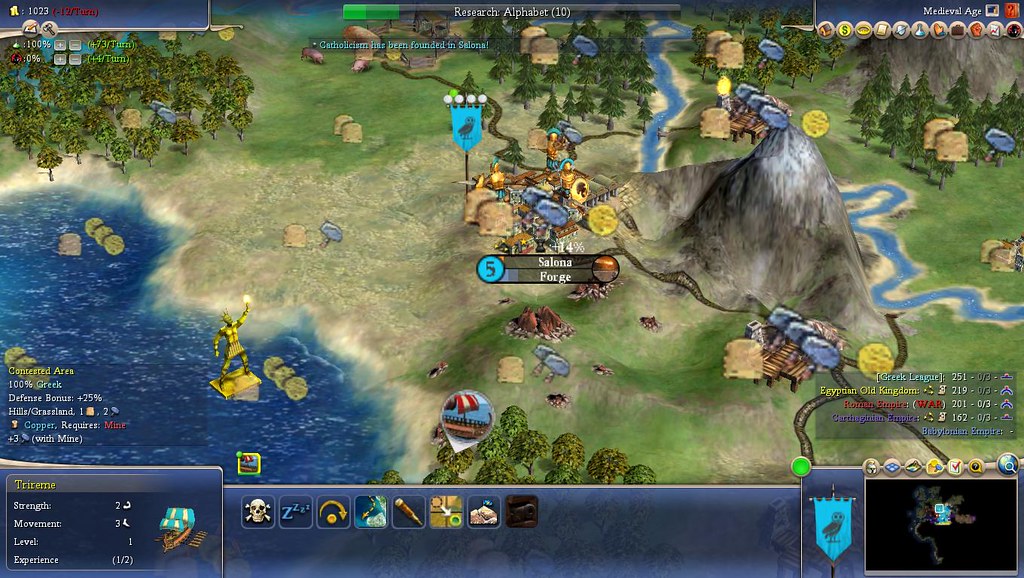
So here we are. We’ve managed our first big goal (founding Christianity), gotten pillaged a little by the Romans, and built all sorts of wonders. Hope everyone is enjoying things so far. I honestly don’t know where exactly I should go from here. I could try to push into Italy, expand into Anatolia or the northern Black Sea, or just turtle up and build build build. I’m open to any suggestions, feedback, whatever you guys have to offer. Until next time!










 I think quite a few people will be sad not to see Constantinople.
I think quite a few people will be sad not to see Constantinople.